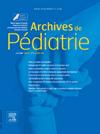早产儿7岁时入学年龄和学业困难:对年龄矫正教育的呼吁:早产儿7岁时入学年龄和学业困难。
IF 1.3
4区 医学
Q3 PEDIATRICS
引用次数: 0
摘要
背景:非常早产的儿童有更大的学习困难(AD)风险。由于早产,他们中的一些人在怀孕期间比预期提前一年开始上学。本研究的目的是分析7岁时神经发育、入学年龄和AD之间的关系。方法:对2007年1月1日至2014年12月31日期间出生在33周前的7岁儿童进行AD评估,并纳入LIFT队列。为了分析入学年龄与AD之间的关系,我们使用了广义方程,并调整了围产期、社会经济因素和5岁时通过年龄阶段问卷(ASQ)评估的神经发育。此外,我们使用全球学者适应(GSA)评分来评估学校适应。结果:2599名儿童正常上学。597例(23.0%)提前一年入学。公元1943/2599年(74.8%)。提前一年上学与AD发病率增加有关:暴露组为35.4%,未暴露组为20.2%,相对危险度为1.76 (95% CI: 1.48;2.08)。提前一年入学和5岁时的ASQ与7岁时的GSA得分独立相关:标准化β = -0.15 (95% CI:-0.10;-0.20)和0.40 (95% CI: 0.35;分别为0.45)。结论:怀孕期间比预期早一年上学与早产儿7岁时阿尔茨海默病的发病率增加有关,这与ASQ评估的5岁时的神经发育情况无关。以矫正年龄为入学年龄似乎可以减轻这种风险。本文章由计算机程序翻译,如有差异,请以英文原文为准。
School-entry age and academic difficulties at 7 years of age in children born very preterm: A call for age-corrected schooling
Background
Very preterm children are at greater risk of academic difficulties (AD). Some of them start school a year earlier than anticipated during pregnancy due to being born preterm. The aim of this study was to analyze the relationship between neurodevelopment, school-entry age, and AD at age seven.
Method
AD were assessed at age seven in children born before 33 weeks of gestation between January 1st, 2007 and December 31, 2014 and enrolled in LIFT cohort. To analyze the relationship between school-entry age and AD, we used generalized equations with adjustment for perinatal, socio-economic factors, and neurodevelopment assessed by Age Stages Questionnaire (ASQ) at 5 years. Moreover, we used Global Scholar Adaptation (GSA) score to evaluate the school adaptation.
Results
2599 children were in routine schooling. Entering school a year earlier was observed in 597 (23.0 %). AD was known for 1943/2599 (74.8 %). Starting school a year earlier was associated with an increased rate of AD: 35.4 % in the exposed group versus 20.2 % in the non-exposed group, with a relative risk of 1.76 (95 % CI: 1.48; 2.08). Both starting school a year earlier and ASQ at 5 years old were independently associated with the GSA score at age 7: standardized β = -0.15 (95 % CI:-0.10;-0.20) and 0.40 (95 % CI: 0.35; 0.45) respectively.
Conclusion
Starting school a year earlier than anticipated during pregnancy was associated with an increased rate of AD at age 7 in children born very preterm, independently of their neurodevelopment at age 5 assessed by ASQ. Basing school entry age on corrected age seems appropriate to mitigate this risk.
求助全文
通过发布文献求助,成功后即可免费获取论文全文。
去求助
来源期刊

Archives De Pediatrie
医学-小儿科
CiteScore
2.80
自引率
5.60%
发文量
106
审稿时长
24.1 weeks
期刊介绍:
Archives de Pédiatrie publishes in English original Research papers, Review articles, Short communications, Practice guidelines, Editorials and Letters in all fields relevant to pediatrics.
Eight issues of Archives de Pédiatrie are released annually, as well as supplementary and special editions to complete these regular issues.
All manuscripts submitted to the journal are subjected to peer review by international experts, and must:
Be written in excellent English, clear and easy to understand, precise and concise;
Bring new, interesting, valid information - and improve clinical care or guide future research;
Be solely the work of the author(s) stated;
Not have been previously published elsewhere and not be under consideration by another journal;
Be in accordance with the journal''s Guide for Authors'' instructions: manuscripts that fail to comply with these rules may be returned to the authors without being reviewed.
Under no circumstances does the journal guarantee publication before the editorial board makes its final decision.
Archives de Pédiatrie is the official publication of the French Society of Pediatrics.
 求助内容:
求助内容: 应助结果提醒方式:
应助结果提醒方式:


